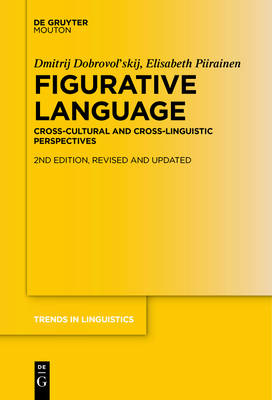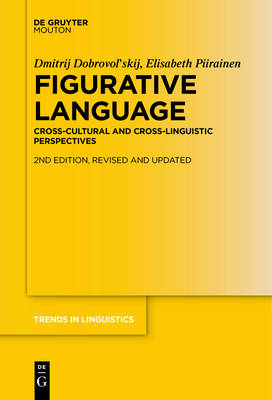
Door een staking bij bpost kan je online bestelling op dit moment iets langer onderweg zijn dan voorzien. Dringend iets nodig? Onze winkels ontvangen jou met open armen!
- Afhalen na 1 uur in een winkel met voorraad
- Gratis thuislevering in België vanaf € 30
- Ruim aanbod met 7 miljoen producten
Door een staking bij bpost kan je online bestelling op dit moment iets langer onderweg zijn dan voorzien. Dringend iets nodig? Onze winkels ontvangen jou met open armen!
- Afhalen na 1 uur in een winkel met voorraad
- Gratis thuislevering in België vanaf € 30
- Ruim aanbod met 7 miljoen producten
Zoeken
Figurative Language
Cross-Cultural and Cross-Linguistic Perspectives
Dmitrij Dobrovol'skij, Elisabeth Piirainen
€ 30,45
+ 60 punten
Omschrijving
The book develops a Theory of the Figurative Lexicon. Units of the figurative lexicon (conventional figurative units, CFUs for short) differ from all other elements of the language in two points: Firstly, they are conventionalized. That is, they are elements of the mental lexicon - in contrast to freely created figurative expressions. Secondly, they consist of two conceptual levels: they can be interpreted at the level of their literal reading and at the level of their figurative meaning - which both can be activated simultaneously.
New insights into the Theory of Figurative Lexicon relate, on the one hand, to the metaphor theory. Over time, it became increasingly clear that the Conceptual Metaphor Theory in the sense of Lakoff can only partly explain the conventional figurativeness. On the other hand, it became clear that "intertextuality" plays a far greater role in the CFUs of Western cultures than previously assumed.
The book's main target audience will be linguists, researchers in phraseology, paremiology and metaphor, and cultural studies. The data and explanations of the idioms will provide a welcome textbook in courses on linguistics, culture history, phraseology research and phraseodidactics.
New insights into the Theory of Figurative Lexicon relate, on the one hand, to the metaphor theory. Over time, it became increasingly clear that the Conceptual Metaphor Theory in the sense of Lakoff can only partly explain the conventional figurativeness. On the other hand, it became clear that "intertextuality" plays a far greater role in the CFUs of Western cultures than previously assumed.
The book's main target audience will be linguists, researchers in phraseology, paremiology and metaphor, and cultural studies. The data and explanations of the idioms will provide a welcome textbook in courses on linguistics, culture history, phraseology research and phraseodidactics.
Specificaties
Betrokkenen
- Auteur(s):
- Uitgeverij:
Inhoud
- Aantal bladzijden:
- 503
- Taal:
- Engels
- Reeks:
- Reeksnummer:
- nr. 350
Eigenschappen
- Productcode (EAN):
- 9783111255606
- Verschijningsdatum:
- 8/05/2023
- Uitvoering:
- Paperback
- Formaat:
- Trade paperback (VS)
- Afmetingen:
- 156 mm x 234 mm
- Gewicht:
- 766 g

Alleen bij Standaard Boekhandel
+ 60 punten op je klantenkaart van Standaard Boekhandel
Beoordelingen
We publiceren alleen reviews die voldoen aan de voorwaarden voor reviews. Bekijk onze voorwaarden voor reviews.











